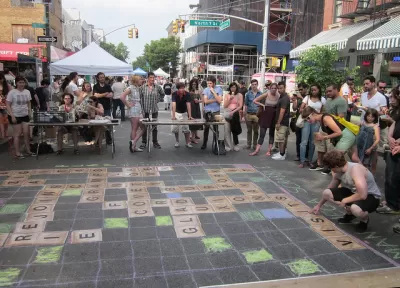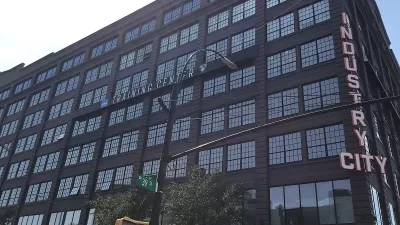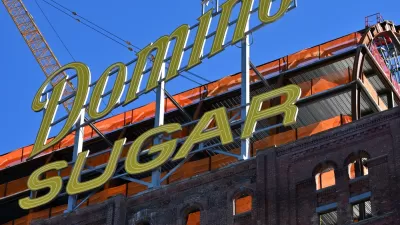Aspiring-to-be-hip cities across the county tout themselves as the "next Brooklyn." Ben Adler argues not only the Brooklyn is a lousy model for revitalization but also that hipster-led gentrification does not lead to overall prosperity.

Over the past ten years, the once-forgotten borough of Brooklyn has become the standard for all things hip, revitalized, and deliciously urban. Other cities, in turn, have aspired to become the "next Brooklyn" or have been crudely dubbed the "next Brooklyn" by observers, many of whom have a New York bias. Grist's Ben Adler unpacks these optimistic proclamations, noting that Brooklyn itself—as in the whole borough—isn't even the next Brooklyn and that threats of displacement and rising costs of living for remaining residents pose significant challenges.
In other words, gentrification's benefits are limited while its perils may be more widespread than boosters would like to think. Brooklyn is therefore as much a cautionary tale as it is an exemplar.
"The irony is that a series of neighborhoods in Manhattan were the epitome of gentrification for decades before Brooklyn was: first Greenwich Village, then the East Village and the Lower East Side (for artsy bohemians), the Upper West Side (for genteel liberal professionals), and SoHo and Tribeca (for visual artists who turned abandoned factories into lofts and studios)."
"Most of Brooklyn — New York City’s second-poorest borough after the Bronx — is untouched by gentrification. Looking at Brooklyn as a whole, you see little evidence of growing affluence. According to the U.S. Census, in 2013 only 31 percent of Brooklynites over the age of 25 had a bachelor’s degree, the median household income was only $46,000 per year, and 23 percent of residents lived in poverty."
"Yes, parts of Brooklyn such as Williamsburg and Park Slope, where I grew up, have higher incomes and lower poverty rates than they did 20 years ago. But that’s not because the poor people who lived there 20 years ago have been blessed with higher-paying jobs. It’s because they’ve been kicked out and replaced with richer people who grew up elsewhere."
"So what does it mean for the counterparts of these communities in Compton or Detroit to say their city will become the next Brooklyn? Nothing — it’s a meaningless statement. If you walk around Brownsville right now, you will see no evidence that it is a better, happier place because Williamsburg is expensive and filled with European tourists buying Brooklyn-themed t-shirts."
"Nonetheless, Compton’s Mayor Brown and the rest of the “next Brooklyn” crowd are right about one thing: a city being a desirable destination for professionals can benefit that city’s residents and society as a whole. Detroit has only 37 percent of its peak population. In depopulated Rust Belt cities, attracting any taxpaying residents is a good thing for them and for the environment. These communities need to regain density to revitalize their economies and lower their per capita carbon footprint."
FULL STORY: Why cities should stop trying to be the next Brooklyn

Planetizen Federal Action Tracker
A weekly monitor of how Trump’s orders and actions are impacting planners and planning in America.

Maui's Vacation Rental Debate Turns Ugly
Verbal attacks, misinformation campaigns and fistfights plague a high-stakes debate to convert thousands of vacation rentals into long-term housing.

San Francisco Suspends Traffic Calming Amidst Record Deaths
Citing “a challenging fiscal landscape,” the city will cease the program on the heels of 42 traffic deaths, including 24 pedestrians.

Amtrak Rolls Out New Orleans to Alabama “Mardi Gras” Train
The new service will operate morning and evening departures between Mobile and New Orleans.

The Subversive Car-Free Guide to Trump's Great American Road Trip
Car-free ways to access Chicagoland’s best tourist attractions.

San Antonio and Austin are Fusing Into one Massive Megaregion
The region spanning the two central Texas cities is growing fast, posing challenges for local infrastructure and water supplies.
Urban Design for Planners 1: Software Tools
This six-course series explores essential urban design concepts using open source software and equips planners with the tools they need to participate fully in the urban design process.
Planning for Universal Design
Learn the tools for implementing Universal Design in planning regulations.
Heyer Gruel & Associates PA
JM Goldson LLC
Custer County Colorado
City of Camden Redevelopment Agency
City of Astoria
Transportation Research & Education Center (TREC) at Portland State University
Jefferson Parish Government
Camden Redevelopment Agency
City of Claremont




























